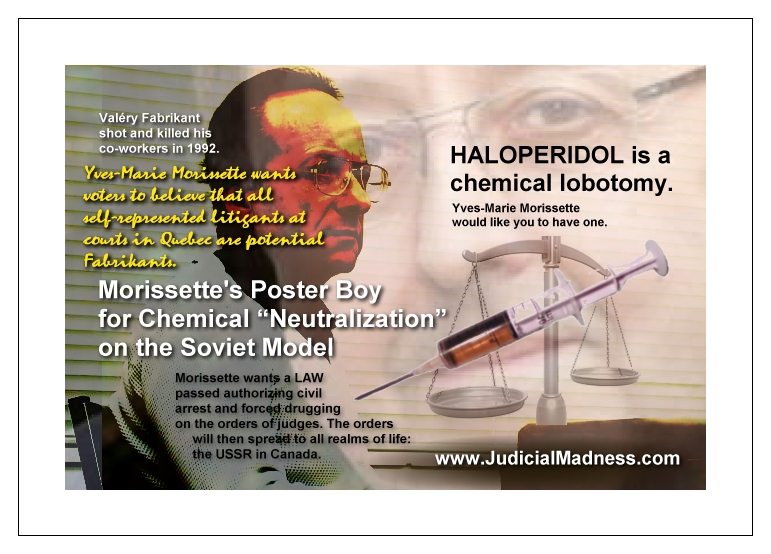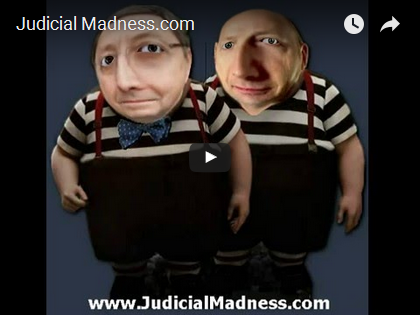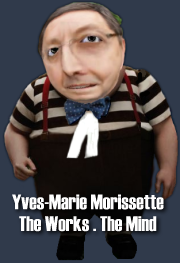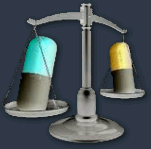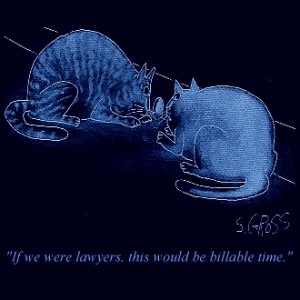Les plaideurs compulsifs, des obsédés du tribunal
Compulsive litigants,
obsessed with the courts
|
Le dimanche 13 août 2006 LE CAUCHEMAR DES JUGES |
Sunday, August 13, 2006 THE JUDGES’ NIGHTMARE |
|
|
|
|
Vue du Palais de justice de Montréal. (Photo André Tremblay, La Presse) |
View of the Montreal Courthouse. (Photo by André Tremblay, La Presse) |
|
Richard Biron |
Richard Biron |
|
Le nombre de plaideurs compulsifs grandit. Belliqueux à l’extrême, multipliant les poursuites sans aucune chance de succès, 85 personnes figurent sur une liste noire du ministère de la Justice. Une hausse de 47% depuis trois ans. À comportement extrême, mesure extrême: depuis 1996, les tribunaux peuvent empêcher une personne d’intenter une poursuite à moins d’obtenir la permission d’un juge. Dans le jargon juridique, ces personnes sont appelées «quérulentes» (du latin «querulus» signifiant «qui se plaint»). En plus de multiplier les recours, les obsédés du tribunal adoptent souvent un comportement excédant. L’un d’entre eux a, par exemple, envoyé à un juge une lettre à laquelle était jointe ce qu’il a appelé «l’expectoration de ses sinus». |
The number of compulsive litigants is growing. Quarrelsome in the extreme, multiplying law suits with no chance of success, 85 people are featured on a black list of the Ministry of Justice. An increase of 47% in three years. With extreme behavior, come extreme measures: as of 1996, the courts can prevent a person from instituting a law suit without first obtaining the permission of a judge. In legal jargon, these people are called “querulous” (from the Latin “querulus” meaning “he who complains”). In addition to multiplying recourses, those obsessed with the courts often adopt extreme behavior. One of them has, for example, senta letter to a judge to which was attached what he called “the expectoration of his sinuses”. |
|
Ce citoyen, c’était Pierre-Gilles Tremblay. Depuis septembre 2005, il ne peut plus poursuivre sans permission les parties qu’il a combattues pour une histoire d’erreur médicale. Le feuilleton a duré 15 ans et s’est transportée devant toutes les instances possibles. Le 15 avril 2004, sa poursuite comportait 403 pages et 38 conclusions. Il entend maintenant s’adresser au Haut Commissariat des Nations unies pour les droits de l’homme. |
This citizen was Pierre-Gilles Tremblay. As of September 2005, he can no longer institute legal proceedings against parties he has fought concerning a history of medical errors, without permission. The saga lasted 15 years and was carried on before very possible instance. On April 15th, 2004, his law suit comprised 403 pages and 38 conclusions. He now intends to address himself to the Office of the High Commissioner of the United Nations for the Rights of Man. |
|
Les magistrats appelés à se prononcer sur le cas des plaideurs compulsifs font presque toujours le même constat que le juge Paul Chaput en 1999 : «Il suffit de constater le nombre d’actions, de requêtes et de plaintes prises par (monsieur) pour conclure à de la démesure, écrivait-il. C’est à croire qu’il fait des recours en justice son occupation à temps plein.» |
Magistrates called to pronounce in cases of compulsive litigants almost always remark, as did Judge Paul Chaput in 1999: “It is sufficient to note the number of actions, requests and complaints taken by (Mister) to conclude as to disproportion,” he wrote. “One would have to believe that he makes appeals to justice his full-time occupation.” |
|
Inventifs et absurdes |
Inventive and absurd |
|
Les raisonnements des quérulents sont généralement dépourvus de toute base juridique. «Ce sont souvent des arguments qui au départ semblent absurdes, mais qui sont quand même de nature à piquer la curiosité du juge», indique le juge Yves- Marie Morrissette, de la Cour d’appel du Québec. Ancien professeur de droit à l’Université McGill, le magistrat s’est d’abord penché sur le phénomène comme académicien. |
The reasoning of querulents is generally devoid of any legal basis. “These are often arguments at the outset which seem absurd, but which are nevertheless of a kind likely to pique the curiosity of the judge”, says Judge Yves-Marie Morrissette of the Court of Appeal of Quebec. A former law professor at McGill University, the magistrate initially considered the phenomenon as an academic. |
|
«Les quérulents se signalent à la fois par leur inventivité et leur incongruité», remarque- t-il. Le plus célèbre des quérulents du Québec, le meurtrier Valery Fabrikant, avait par exemple invoqué une loi de 1495 adoptée sous le règne d’Henri VIII pour prétendre que les gens pauvres jouissaient d’un droit d’appel ! |
“Querulents announce themselves both by their inventiveness and their incongruity”, he remarks. The most famous of the Quebec querulents, murderer Valery Fabrikant, for example had cited a law of 1495 adopted in the reign of Henry the VIIIth to claim that poor people enjoyed a right of appeal! |
|
Lorsqu’ils retirent aux obsessifs du tribunal leur droit d’intenter inconditionnellement des poursuites, les juges sont souvent cinglants. Les mots «frivole», «dilatoire» ou «mauvaise foi» deviennent très utiles. Les plaideurs obsessifs ont besoin de beaucoup de temps. Pierre-Gilles Tremblay n’y est pas allé à la légère dans la préparation de sa cause en responsabilité médicale. «J’ai consulté une centaine de médecins, sinon plus», assure-t-il. «Il y a une vingtaine d’experts médicaux qui sont venus engueuler le juge en anglais et en français», ajoute celui dont le procès a duré 38 jours. |
When they withdraw from court-obsessives their unconditional right to institute procedures, the judges are often stinging. The words “frivolous”, “dilatory” or “bad faith” become very useful. Obsessive litigants need a great deal of time. Pierre-Gilles Tremblay did not go lightly in the preparation of his case in medical liability. “I consulted a hundred doctors, if not more”, he assures. “Some twenty medical experts came to jabber at the judge in English and in French”, adds he whose trial lasted 38 days. |
|
M. Tremblay est responsable des relations du travail dans la fonction publique québécoise. Depuis trois ans, il est en congé de maladie, ayant «fait plusieurs dépressions majeures». «Tous les médecins s’entendent pour dire que j’ai eu une histoire d’horreur», justifie-t-il. À un certain moment, il occupait son emploi tout en préparant sa cause. «Je travaillais là-dessus le soir et pendant l’heure du midi», mentionne-t-il. |
Mr. Tremblay is in charge of labor relations in the Quebec public service. For three years, he has been on sick leave, “having had several major depressions”. “All the doctors agree in saying that I had a history of horror”, ihe justifies. At one time, he held his job while preparing his case. “I worked on it in the evening and at lunch hour”, he mentions. |
|
Un enfer pour les cibles |
A Hell for those targeted |
|
Le problème n’est pas tant que les plaideurs compulsifs engorgent les tribunaux. «C’est surtout que les quérulents empoisonnent la vie de ceux qui sont leurs cibles», dit le juge Morrissette. Le plaideur peut devenir un véritable |
The problem is not so much that compulsive litigants are clogging the courts. “It is above all that the querulents poison the life of those who are their targets”, says Judge Morrissette. The litigant can become a veritable assailant, which obliges his prey to spend a fortune in lawyer’s fees. La Presse contacted a few targets of these litigants drawn from all directions. All refused to share their experience, for fear of reprisals. One person even claimed to be afraid for her close relations. The very large majority of compulsive litigants is not represented by a lawyer and thus does not have to pay fees directly. In fact, these people when they lose are often condemned to pay costs, i.e. a compensation to the opposing party for the lawyers’ fees thatt had to be engaged. The bill can be high. Pierre Gilles Tremblay knows something about it. |
|
«Les dépens ont été chiffrés à quelque 150 000$ ou 160 000$, indique-t-il en entrevue. Ça n’a pas encore été payé. Il y a déjà eu la possibilité d’une entente à l’amiable.» |
“Costs have been quantified at some $150,000 or $160,000, he says in an interview. It hasn’t been paid yet. There has already been the possibility of an amicable agreement.” |
|
Une liste non exhaustive |
A non-exhaustive list |
|
«C’est un mal marginal dans la société, mais assez répandu devant les tribunaux», estime le juge Morrissette. Les sociétés qui accordent une grande importance à l’accès à la justice comptent davantage de plaideurs compulsifs. «Plus on facilite le recours aux tribunaux, plus on rend possible l’abus du droit d’ester en justice», constate-t-il. |
“It is a marginal ill in society, but rather widespread before the courts”, estimates Judge Morrissette. Societies which attach great importance to access to justice count more compulsive litigants. “The more one facilitates the recourse to the courts, the more one makes possible abuse of the right to institute legal proceedings”, he notes. |
|
Ainsi, en Angleterre, le gouvernement Blair a entrepris une grande réforme de l’accès aux tribunaux. À partir de 1999, une série de mesures ont été mises en place pour faciliter la vie aux justiciables qui se représentent seuls. Des stands d’information ont été créés, des exemples de procédures mis en ligne, d’autres modes de règlement des différends (comme la médiation) ont été privilégiés. Résultat? Le nombre de vexatious litigants, les citoyens en proie à la forme la plus extrême de quérulence, a grimpé en flèche. Pendant un siècle, les tribunaux en ont identifié un total de 70. Depuis 1995, on en compte environ 110 de plus. Beaucoup d’obsessifs de la procédure ne figurent pas sur la liste. «Il y a pas mal plus de quérulents si on compte les instances administratives comme les ombudsmans ou le comité de discipline du Barreau», estime le juge Morrissette. |
Thus, in England, the Blair government undertook a great reform of access to the courts. As of 1999, a series of measures were introduced to facilitate the life of the self-represented litigant. Information stands were created, examples of procedures put online, alternative modes of dispute settlement (such as mediation) were favoured. The result? The number of vexatious litigants, citizens who are they prey of the most extreme form of querulence, climbed like an arrow. For a century, the courts had identified a total of 70. Since 1995, some 100 more of them can be counted. Many obsessives of procedure are not named on the list. “There are quite a few more querulents if one counts the administrative instances, such as the ombudsmen or the disciplinary committee of the Bar”, estimates Judge Morrissette. |
|
L’équipe de Cyberpresse vous suggère : Plaideurs compulsifs: des cas psychiatriques à traiter? |
The Cyberpresse team recommends: Compulsive pleaders: psychiatric cases to be treated? |


